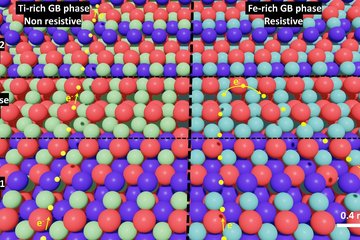All genres
2441.
Thesis - PhD
Modeling and Experiment on Mo-based high temperature composites. Dissertation, Ecole Centrale Paris, Laboratoire for Materials, Paris [France] (2008)
2442.
Thesis - PhD
Kristallographische Texturen und richtungsabhängige mechanische Eigenschaften des Exoskeletts des amerikanischen Hummers sowie Texturen weiterer Biomaterialien. Dissertation, RWTH Aachen, Aachen, Germany (2008)
2443.
Thesis - PhD
Microstructure and mechanical properties of the exoskeleton of the lobster Homarus americanus as an example of a biological composite material. Dissertation, RWTH Aachen, Aachen, Germany (2008)
2444.
Thesis - PhD
Experimental and theoretical investigation of nanoindentation in a Cu single crystal. Dissertation, RWTH Aachen, Aachen, Germany (2008)
2445.
Thesis - PhD
Micromechanical Modeling and Simulations of Tranformation-Induced Plasticity in Multiphase Carbon Steels. Dissertation, TU Delft, Delft, The Netherlands (2008)
2446.
Thesis - PhD
Korrelation von mechanischen Eigenschaften und Kristallorientierung auf mikroskopischer und nanoskopischer Ebene. Dissertation, RWTH Aachen, Aachen, Germany (2008)
2447.
Thesis - PhD
Characterization of the Microstructure, Grain Boundaries and Texture of Nanostructured Electrodeposited CoNi by use of EBSD. Dissertation, RWTH Aachen, Aachen, Germany (2007)
2448.
Thesis - PhD
Crystallographic Texture of the Arthropod Cuticle Using Synchrotron Wide Angle X-ray Diffraction. Dissertation, RWTH Aachen, Aachen, Germany (2007)
2449.
Thesis - PhD
Charakterisierung und Entwicklung von bainitischen Multiphasen-Stählen. Dissertation, RWTH Aachen, Aachen, Germany (2007)
2450.
Thesis - PhD
Application of a dislocation density based flow stress model in the integrative through-process modeling of Aluminium production. Dissertation, RWTH Aachen, Aachen, Germany (2007)
2451.
Thesis - PhD
Der tribologisch asymmetrische Flachstauchversuch - Eine neue Methode zur Analyse von Reibungsvorgängen bei Umformprozessen. Dissertation, RWTH Aachen, Aachen, Germany (2001)
2452.
Thesis - Diploma
Untersuchung der Abhängigkeit des Ölaustrags von der Oberflächenfeinstruktur beim Auswalzen gedoppelter Aluminiumfolien. Diploma, HS Niederrhein, Krefeld, Germany (2003)
2453.
Thesis - Diploma
Deformation of Semi-Brittle Intermetallic Material under Superimposed Hydrostatic Pressure. Diploma, Ecole Centrale de Nantes, Nantes, France (2002)
2454.
Thesis - Master
An optimized method to determine initial parameters of advanced yield surfaces for sheet metal form-ing applications. Master, Ruhr-Universität Bochum (2021)
2455.
Thesis - Master
Hydrogen Associated Decohesion and Localized Plasticity in a Dual-phase Lightweight Steel. Master, RWTH Aachen University (2020)
2456.
Thesis - Master
Using Machine Learning and Data-driven Approaches to Predict Damage Initiation in Dual-Phase Steels. Master, Ruhr-Universität Bochum (2020)
2457.
Thesis - Master
On the role of defects in Ir-Ru alloys for energy conversion applications. Master, RWTH Aachen University (2020)
2458.
Thesis - Master
Recrystallization behavior and mechanical properties of interstitially alloyed CoCrFeMnNi equiatomic high entropy alloy. Master, RWTH Aachen University (2020)
2459.
Thesis - Master
Investigation of the low cyclic fatigue behavior of high manganese steels. Master, RWTH Aachen University (2019)
2460.
Thesis - Master
A Physics Based Crystal Plasticity Model for Cyclic Deformation. Master, Ruhr-Universität Bochum (2019)











